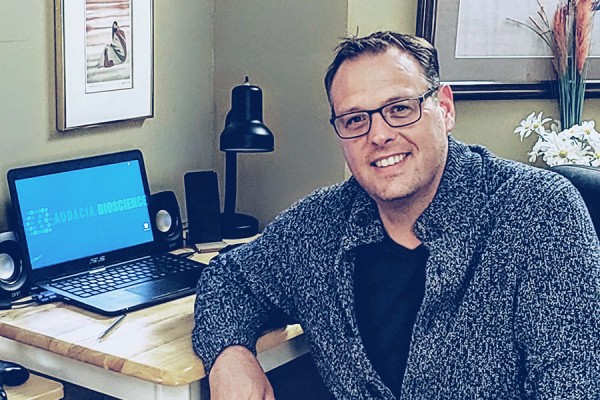 Jon Brooks of Audacia Bioscience praised the contributions of UWindsor co-op students to his company’s work on COVID testing and tracing.
Jon Brooks of Audacia Bioscience praised the contributions of UWindsor co-op students to his company’s work on COVID testing and tracing.
Four UWindsor students — three majoring in computer science and one in business — had an opportunity to make a direct impact on the spread of COVID-19, securing co-operative education placements with a company developing products to help manage testing for the disease.
The start-up, Audacia Bioscience, specializes in immunoassays and has used that expertise to develop antibody and antigen tests as well as virtual clinical trial software. The four students — Julia Garant, Raj Patel, Jenil Bhindi, and Max Ouellette — worked with the organization at the infancy stages of understanding the pandemic back in March, tasked with the development and launch strategy for one of its products that collects data from tests and trial.
They learned new skills as they were onboarded remotely and worked in a fast-paced environment in uncertain times from their desks at home.
Jon Brooks, chief operations officer at Audacia Bioscience, said each of the students make a unique contribution to advancing the project.
Patel is an “exceptional” back-end programmer, Brooks said: “Immediately understanding how the needs of the business can intersect with the technical challenges of platforms is extraordinarily helpful in bringing projects to completion.”
Bhindi was largely responsible for the contact tracing portion of the firm’s Employee Assessment App
“At the time, the contact tracing component was a very new and unique piece of technology,” said Brooks. “Jenil was able to unpack it, understand it, and very quickly work to integrate it into our current tech.”
He called Garant’s contributions “critical” as a designer and programmer of the user experience.
“Working remotely, one of the big challenges is conveying what you want out of a layout or an idea. In person, it's easy enough to sketch out an idea, or use examples to illustrate your needs,” he said. “With remote work, the ability to pick up on the key points of a layout through virtual meetings or instant messaging and transform that into a working model that developers can use and understand is invaluable.”
Brooks also praised Ouellette, a student of the Odette School of Business.
“Max was integral in developing our sales channels and helping set up our supply chain in a wildly unpredictable time,” Brooks said. “Max worked on the market research required to secure clients, as well nailing down pitches that were curated to different market segments.”
Kristen Morris, manager of Co-operative Education and Workplace Partnerships, said she was excited by the opportunities afforded these students by the federal Student Work Placement Program.
“This funding allowed us to bring this employer from never hiring co-op students before to securing four students in one term,” said Morris. “This type of industry exposure at the infancy stages of a pandemic would not have been possible otherwise and we are happy to partner with organizations to secure funding allowing them to move faster and have the latest classroom learning come alive within a project like this.”
